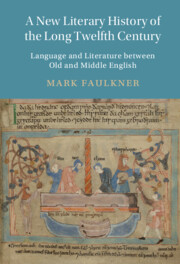 A New Literary History of the Long Twelfth Century
A New Literary History of the Long Twelfth Century from Part II - The Affordances of English
Published online by Cambridge University Press: 14 July 2022
This chapter offers an analysis of the shifting fortunes of Latin, English and French between the mid eleventh and early thirteenth centuries, through the lens of linguistic ecology, drawing evidence from metalinguistic commentary in narrative sources, surviving texts, prosopography and onomastics and the findings of the linguistic subdiscipline of language contact. It argues for distinguishing between the period between 1066 and 1140, when the relatively high status English had enjoyed before the Norman Conquest reduced primarily at the hands of Latin, from that between 1050 and 1215, when emergence of French as a literary language, coupled with other late-twelfth-century social changes, more significantly diminished English’s importance as a written language. The chapter closes with some reflections on the factors that condition language choice in multilingual societies, rejecting a simple equation of language and identity.
To save this book to your Kindle, first ensure no-reply@cambridge.org is added to your Approved Personal Document E-mail List under your Personal Document Settings on the Manage Your Content and Devices page of your Amazon account. Then enter the ‘name’ part of your Kindle email address below. Find out more about saving to your Kindle.
Note you can select to save to either the @free.kindle.com or @kindle.com variations. ‘@free.kindle.com’ emails are free but can only be saved to your device when it is connected to wi-fi. ‘@kindle.com’ emails can be delivered even when you are not connected to wi-fi, but note that service fees apply.
Find out more about the Kindle Personal Document Service.
To save content items to your account, please confirm that you agree to abide by our usage policies. If this is the first time you use this feature, you will be asked to authorise Cambridge Core to connect with your account. Find out more about saving content to Dropbox.
To save content items to your account, please confirm that you agree to abide by our usage policies. If this is the first time you use this feature, you will be asked to authorise Cambridge Core to connect with your account. Find out more about saving content to Google Drive.